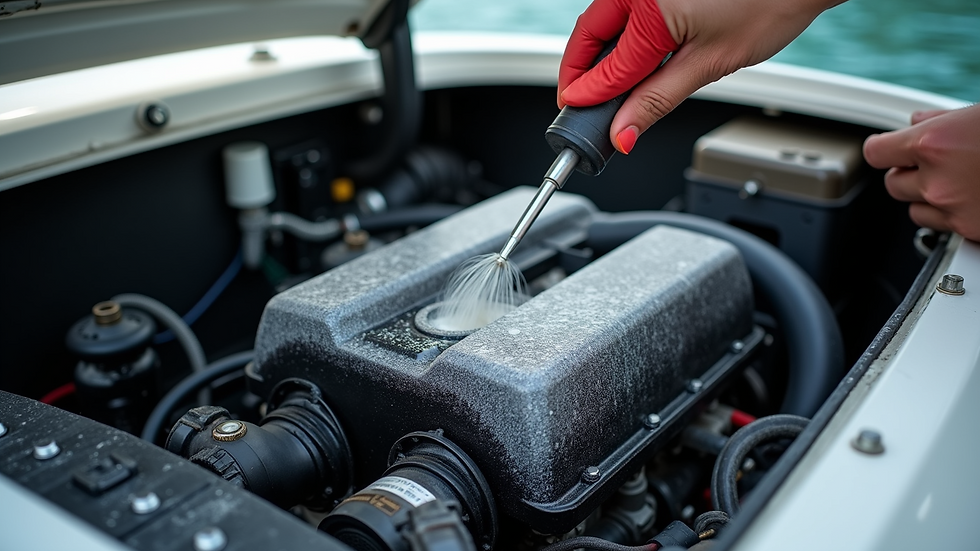Ethanol Gasoline in Outboard Engines
- Oct 9, 2021
- 3 min read
Why can using ethanol gasoline in outboard engines be a problem? After all, it runs well in cars and should be fine for marine outboards, right? Let’s look at where the problems arise, then look at fuel additive options to protect your engine if you still decide to use ethanol gasoline.

What’s the problem with using ethanol-gasoline in outboard engines?
Ethanol is added to gasoline to raise the octane level allowing it to burn efficiently in a combustion engine. Ethanol is generally derived from corn and is considered a renewable fuel. However, the problem lies in the very physical nature of ethanol.
Ethanol prefers to bond with water rather than gasoline. Through the natural process of condensation, your boat operating in a water environment, and accidental introduction of water into the fuel system, water finds its way into the fuel tank.
Water is heavier than gasoline. If both water and ethanol gas is in the fuel tank, water will sit on the bottom of the tank – your fuel pump is also at the bottom of the tank. This is a problem, but the problem is about to compound. If there is enough water is in the fuel tank, ethanol will leave the gasoline and bond with the water potentially doubling the volume of the water in your tank. You can end up with water enriched with ethanol, rather than ethanol enriched gasoline.
This leaves the gasoline with a much lower octane level while reducing the volume of the now diminished octane gasoline by the amount of ethanol that left to bond with water. This process is called phase separation in the gasoline. The octane of your gasoline drop and, again, increases the volume of water in the fuel tank. If your fuel system experiences phase separation it can not only cause your engine to stop running but could cause serious damage or even total failure.
Additionally, in older model engines, the rubber hoses and plastics of the fuel system were not manufactured to withstand the effects of ethanol and will degrade over a relatively short time period, in some cases literally dissolving. This can lead to a multitude of hazards including fire.
However, thankfully there is a wide selection of highly effective fuel additives designed to help offset the impacts of ethanol gasoline. The following is a sampling of such products.

Yamalube Ring Free PLUS
Yamaha took Ring Free, the proven engine deposit package, and made it even better. Our exclusive, synthetic PLUS formula provides superior deposit control, cleaning fuel injectors, carburetors, intake valves, intake ports, and combustion chambers. Featuring metal filmers, it also protects silver solder, copper, aluminum, and steel in a fuel system from the corrosive effects of ethanol sulfate salt.
Yamalube Fuel Stabilizer & Conditioner PLUS
Strongly recommended for E10 fuels, this alcohol-free formula helps prevent fuel oxidation (when ethanol absorbs moisture from the air) and phase separation from moist, rich air. When used continuously, it keeps fuel fresh, potent, and free from gum and varnish for up to one year of storage. Its metal filmers, provide extensive protection for steel and aluminum components.
Mercury QUICKARE
Maximizes engine performance with all grades of gasoline. Cleans up existing varnish and gum deposits from fuel lines, tanks, carburetors and injectors, intake valves, and spark plugs Keeps fuel fresh between fill-ups – up to three months.
Star-Tron from Star-Brite
Cures and prevents ethanol fuel problems. Makes any engine run more smoothly and start more easily. Eliminates and prevents gum, varnish, and carbon deposits, stabilizes fuel, helps prevent phase separation. It also improves the octane of old, substandard fuel.
CRC Gasoline Fuel Stabilizer
For all two-stroke and four-stroke engines. This product prevents fuel separation caused by ethanol and keeps fuel fresh during storage. It protects against corrosion, prevents gum and resin build-up, and keeps filters and injectors clean.
STA-BIL
Engineered to combat the effects of harsh marine climates and provides a highly effective defense against the harmful effects of ethanol-blended fuels.





Comments